02 Feb 2018 - {{hitsCtrl.values.hits}}

Over the past weeks female candidates have been subjected to attacks ranging from verbal abuse, psychological abuse to physical  violence. The Centre for Monitoring Election Violence(CMEV) has received 34 complaints regarding violence against females during elections. In total 421 complaints have been received regarding election violence. However, activists point out that the number could be more as incidents are not reported due to fear of further reprisal. Sources have pointed fingers at the inefficiency of the police in investigating into these complaints and curbing violence.
violence. The Centre for Monitoring Election Violence(CMEV) has received 34 complaints regarding violence against females during elections. In total 421 complaints have been received regarding election violence. However, activists point out that the number could be more as incidents are not reported due to fear of further reprisal. Sources have pointed fingers at the inefficiency of the police in investigating into these complaints and curbing violence.
According to the Suriya Women’s Development Centre two female candidates contesting from the Manmunai Pattu Pradeshiya Sabha (Batticaloa) have been subjected to character assassination using social media. One has been threatened and stones have been thrown at her residence and windows have been smashed as well. The husband of another female candidate from the Vavunathivu ward has verbally abused her and threatened her though she had discussed with him beforehand about contesting. In a recent press release the Women’s Action Network (WAN), which is a network of 8 women organizations operating in the North and East, listed out that a woman candidate in the Monaragala District, who was involved in election campaigning, was admitted to the hospital in a serious condition after she was brutally attacked. Another female candidate from the Puthukkudiyiruppu area of the Mullaitivu District was physically assaulted, kept locked in a house, and threatened to withdraw the complaint she made to the Police, the statement said.
Female candidates also complained of how males were not supportive. One female candidate told us how she is coerced to provide men with alcohol, so that she could receive their support. WAN in its statement noted of how female candidates in Puttalam and other districts have been verbally humiliated by religious leaders and have been subjected to revolting comments. Further candidates and activists pointed out that female candidates were often told that they would not or could not win at the elections. The Dailymirror also learned that certain male candidates dissuade the public from voting for women.

An amendment to the Local Authorities Act has made it mandatory for political parties and independent groups to include 25 percent of female candidates in their nomination papers. Though this amendment is praiseworthy, with candidates being dissuaded from campaigning, subjected to gender based violence and other forms of harassment and injustice, activists are skeptical of the outcome.
In the light of recent events the Dailymirror spoke to activists, female candidates, the Center for Monitoring Election Violence (CMEV) and the Elections Commission to assess the nature and extent of the violence and injustice faced by female candidates.
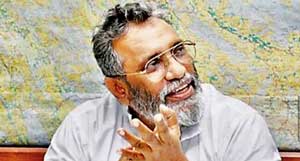
-Mahinda Deshapriya
Elections Commissioner Mahinda Deshapriya said that the commission doesn’t have the power to arrest culprits or initiate legal proceedings against them. “There is a separate unit at the police to investigate such matters. We have informed the police of several incidents. If the house of a candidate has been stoned, for instance, the police should inquire. We too send a team and collect data,” said Deshapriya.
Complaints can also be made to the Elections Commission via [email protected]. “This email account is checked every hour or half an hour,” he said. Further complaints can be lodged through ‘Tell Commission-Elections Commission of Sri Lanka’.
Referring to attacks on female candidates via social media he said candidates could lodge complaints at the cybercrimes division at the police as well. However, he noted that women did not continue with proceedings due to the backlash from society.
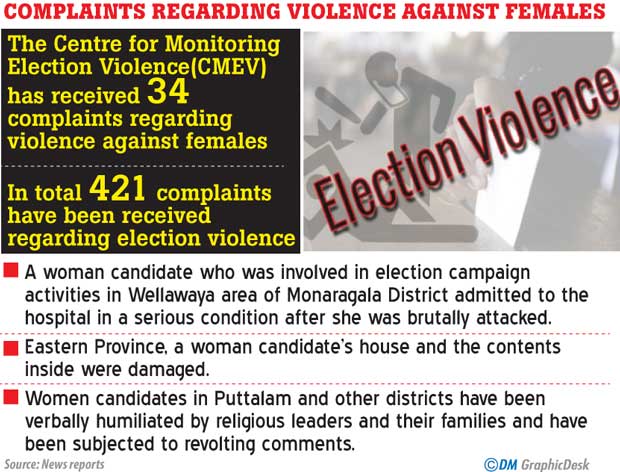
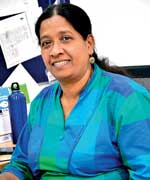
- SumikaPerera
Meanwhile the Coordinator of the Women’s Resource Centre, SumikaPerera based in Kurunegala raised concern about a different aspect of injustices that women have been subjected to. Perera pointed out that some women were given nominations to contest from areas where the opposition was very strong. “Women who were dedicated to their work in a particular area did not get the opportunity to contest from that area. Instead they have to contest in areas where the opposition is strong and where it is impossible to win,” she said. She added that this would ultimately create a notion that despite there being a quota women are not capable of winning elections.
Some female candidates had not been given nominations, and had to join other political parties, she said.
A minimum of 10% women candidates is required in the first nomination list. Perera highlighted that in all wards women were nominated only up to 10%. “They were nominated just to fulfill the requirement and no woman was nominated in addition to this.”
She also noted that groups monitoring violence should take note of psychological violence too, caused by sexist remarks and discouraging sentiments that they are unfit to enter into politics.
“One candidate came to me sobbing that she had been asked to put up ten banners and distribute leaflets as the leader of the party was visiting. I asked her to tell outright that she did not have the money,” she said.
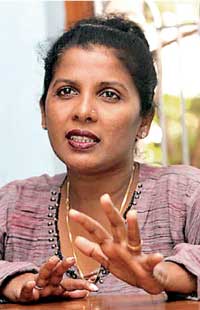
- Nalini Ratnarajah
Political Activist, Nalini Ratnarajah said that mostly women candidates were subjected to character assassination. “This morally, emotionally and psychologically affects them. Women are supposed to be good women, home makers looking after the family. When women face sexist comments, when people threaten them that their child or husband will be abducted, that photographs and videos against them will be released on social media they are asked to stay at home.”
“A candidate who is in her second marriage has been subjected to gossip that she was having an illicit affair with some other man. The husband was supportive at the beginning. But when he started receiving anonymous calls about his wife, though he trusted her, the woman was asked to stop her campaign,” she said.
She stressed that the government should introduce laws to address such violence. “Women are the backbone of the Sri Lankan economy. The government runs the local authorities, provincial councils, and even the Parliament with the foreign revenue earned by women. Half of the population is women. So our voices need to be heard,” she said.
The National Coordinator of the Centre for Monitoring Election Violence (CMEV), Manjula Gajanayake said that under the new electoral system female candidates should be encouraged to win or otherwise the party would be at a disadvantage. “But unfortunately male candidates perceive this as a threat.”
He further pointed out that in certain local areas male candidates were powerful and therefore the police hesitated to take action against them when they have attacked female candidates. Apart from the incidents of explicit violence Gajanayake highlighted how women have been either deceived or dissuaded especially during the nomination period. “Party organizers have made promises that certain women will be nominated but their names have not been added to the nomination list. Most women did not know that they should sign nomination papers under the additional list. Until the deadline of handing over nomination papers some female candidates were not informed whether they would be included or not. If they knew before that they will not be nominated, they could have approached other political parties. So the party organizers were able to successfully and strategically prevent them contesting from other parties,” he said. Further, two unsuspecting women from Mawanella in Kegalle have discovered to their dismay that their names were included in the list of candidates without their knowledge. In Kandy another woman had received an invitation from the police station for an awareness workshop conducted by the police. Upon inquiry from the police she has found out that she had been invited because she is contesting.
When a complaint is lodged at the CMEV the incidents are documented and referred to the election commission and the police for action. The alleged culprits are contacted simultaneously. Further, field coordinators are sent to inquire.
A female candidate said that she had to provide alcohol to her male supporters. “After a meeting or campaigning I have to provide the supporters with alcohol which costs at least Rs. 10 000. Otherwise no man would turn up to go canvassing the next day. They think that we don’t know politics because we don’t display our credentials. Now I go canvassing with two other women,” she said.
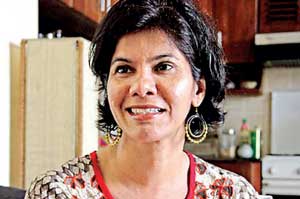
- Shreen Abdul Saroor
Human Rights Activist Shreen Abdul Saroor of the Women’s Action Network (WAN) said that though affirmative action has been taken in the form of a quota to boost female representation, proactive action to make sure female candidates did not undergo violence has not been thought of.
She also referred to an incident in Batticaloa involving a male candidate running a bar who invited neighbourhood men, which included family members of one candidate, for free drinks.“The male candidate has spoken about the appearance of this woman candidate including her lipstick and how she goes around with men. At the end the husband beat her up. The uncle scolded her. This would have never happened to a man,” Saroor said.
“How can this female candidate go and complain of this as election violence? Will the police accept it as election violence? This is domestic violence as it is her husband who has beaten her up. So this is how a male candidate who saw a strong candidacy in this woman tried to weaken her by making sure that she had trouble at home,” she pointed out.
She further said that gender based violence was normalized in Sri Lanka so much so that women can be beaten up and accused of being loose women. She added that the root cause was that there was impunity and immunity to perpetrators of gender based violence.
“Women going around campaigning are called loose women. The Moulavis are using the Friday prayers, the regular sermons to say that the women who are contesting are unislamic, and are breaching the Quran etc. Families of some female candidates have asked them to stay back at home and not campaign as a result. How can they win?” Saroor quizzed.
“The police should arrest at least one person for a day, so that the news is disseminated via the press that a person who attacked a female candidate was arrested. This can work as a deterrent,” she said. “None of the leaders of the political parties have spoken about the plight of these women candidates,” she said.
She pointed out that political parties, particularly minority parties, were unprepared and that they included women for the sake of fulfilling the mandatory requirement
She further said the election commission, the male dominant political parties, and the law and order structures were not geared to look at how difficult it was for women to enter into politics.
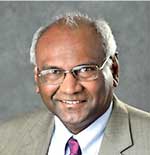
-Prof. S. Rathnajeevan H. Hoole
A member of the Election Commission, Prof. S. Rathnajeevan H. Hoole said that the EC conducts seminars, and informational sessions to women on how to handle such violence.
Referring to the video clips by two Muslim clerics attacking female candidates he said the video has been handed over to the police. “I gave the video and a week later I was told that they were waiting for it to be transcribed and then to be translated into Sinhalese.” He pointed out that a Tamil police officer could have looked into it instead.
Referring to the female candidate’s house which was searched by the police for weapons he said the police searched the house at night without a female constable. He pointed out that the police can trace the phone number and arrest the person who made the false complaint. However, this has not taken place.
Speaking to the Daily Mirror Bisliya Butto, currently the Puttalam District women’s wing coordinator of the Sri Lanka Muslim Congress (SLMC) and a contestant in the forthcoming election said thatat some religious sermons clerics have imposed aprohibition on women contesting. “Moulavis have said that Muslim women who contest are not proper Muslims. They have also said that women cannot get up on stage and speak in public. This affected us psychologically”
She further said that they would take action against such religious leaders who openly dissuaded them from contesting. She added that plans were underway to draw up a petition against the moulavis and obtain the signatures of about 125 persons.
Meanwhile she said the police searched another candidate’s house forweapons based on a false complaint. She claimed that this was because thecandidate was a female.

Another candidate contesting from Arayampathy, Kulanthavadivel Jeyachandrika, said that she has been subjected to character assassination. A photograph taken at an opening ceremony of a road development project where an MP was standing next to her while she was cutting the ribbon has been edited and circulated around. Posters made out of the edited photographs have initially been posted on the walls of her house and later on her close relatives’. “Thereafter the posters were found in public places such as markets and bus stops,” she said.
These posters were also circulated on facebook. “They try to portray me as a loose woman, that I am unfit to be in the community and that I should be thrown out,” she said. Further her house has been stoned and the roof has been damaged.
She had made a complaint at the Kattankudy Police Station on December 06 and had thereafter requested for police protection. To date no protection has been provided.
19 Apr 2024 1 hours ago
19 Apr 2024 2 hours ago
19 Apr 2024 3 hours ago
19 Apr 2024 3 hours ago
19 Apr 2024 4 hours ago